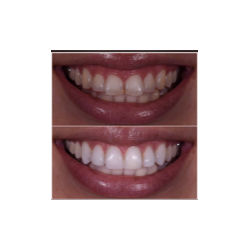Common Patient Questions
How long do veneers last?
How long do veneers take?
Another common question people have about veneers is how long the process takes. The answer is that it depends on the type of veneers you get. Composite veneers can often be done in a single visit. The dentist designs them on your tooth, which is why they’re sometimes referred to as chair-side veneers. On the other hand, porcelain veneers tend to require multiple visits to the dentist before the process has been completed.
How can I reduce sensitivity after treatment?
How much do veneers cost?
Veneers may not be covered by PPO dental insurance because they are considered a cosmetic treatment.
We accept most PPO plans and Medicare Advantage, but do not accept Medicare, Medi-Cal, Denti-Cal, or HMO plans.
The total cost depends on the type of veneer selected and the number of teeth being treated. Our team can provide a personalized estimate and review payment options during your consultation.
Are veneers safe?
When should I consider dental veneers?
-Your teeth are stained or discolored teeth
-Your teeth are crooked or misshaped teeth
-Your teeth have spaces between them
-Your teeth are broken or chipped
Can veneers replace other cosmetic dentistry treatments like bonding or teeth whitening?
Veneers can sometimes replace treatments like dental bonding or teeth whitening, especially when discoloration, chips, or shape concerns are more severe. While whitening only changes color and bonding is best for minor fixes, veneers provide a long-term cosmetic dentistry solution that improves color, shape, and alignment at the same time.
Will veneers look natural with my surrounding teeth?
Yes. Veneers are custom-designed to match your natural teeth in color, size, and shape. Dr. Fariba Bolourchi carefully blends veneers with your existing smile so they look seamless alongside your natural teeth, crowns, or other cosmetic dentistry restorations.
Can veneers be part of a full smile makeover?
Absolutely. Dental veneers are commonly used as part of a smile makeover that may also include teeth whitening, crowns, or orthodontic treatment. Veneers are often the finishing touch that brings balance, symmetry, and brightness to your overall smile.Your Content Goes Here
WHAT WE DO
Our Services
We believe that parents and their dentist must work together to ensure that their family receives the best dental care.
For more information on how to maintain a healthy and beautiful smile
call our office at (661) 259-4800 or contact us online.
CONTACT US
Please use the form below to schedule your dental exam OR call us at (661) 669-7636 to schedule or change your appointment.
We look forward to hearing from you!
CONTACT US
Get In Touch
Feel free to contact Sierra Dental Practice if you have any questions, suggestions, or would like to schedule an appointment with a dentist in Valencia.
We look forward to hearing from you!
Hours
Monday 9:00am – 5:00pm
Tuesday 9:00am – 5:00pm
Wednesday 9:00am – 5:00pm
Thursday 9:00am – 5:00pm
Friday Closed
Every Other Saturday by appointment
8:00am – 12:00pm
Sunday Closed
Call Us Today
Phone: (661) 259-4800
Request An Appointment
24510 Town Center Dr. Suite 240
Valencia, CA 91355
Our Services
Cosmetic Dentistry
Cosmetic Dentistry
Dental Cleaning
Teeth Whitening
Stay Connected





